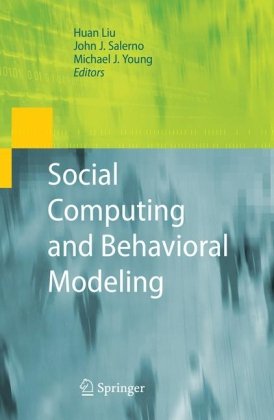

Most ebook files are in PDF format, so you can easily read them using various software such as Foxit Reader or directly on the Google Chrome browser.
Some ebook files are released by publishers in other formats such as .awz, .mobi, .epub, .fb2, etc. You may need to install specific software to read these formats on mobile/PC, such as Calibre.
Please read the tutorial at this link: https://ebookbell.com/faq
We offer FREE conversion to the popular formats you request; however, this may take some time. Therefore, right after payment, please email us, and we will try to provide the service as quickly as possible.
For some exceptional file formats or broken links (if any), please refrain from opening any disputes. Instead, email us first, and we will try to assist within a maximum of 6 hours.
EbookBell Team

4.8
104 reviewsSocial computing concerns the study of social behavior and context based on computational systems. Behavioral modeling reproduces the social behavior, and allows for experimenting, scenario planning, and deep understanding of behavior, patterns, and potential outcomes. The pervasive use of computer and Internet technologies creates an unprecedented environment where people can share opinions and experiences, exchange ideas, offer suggestions and advice, debate and even conduct experiments. Social computing facilitates behavioral modeling in model building, analysis, pattern mining, anticipation, and prediction.
This volume presents material from the second interdisciplinary workshop focused on employing social computing for behavioral modeling and prediction. The book provides a platform for disseminating results and developing new concepts and methodologies aimed at advancing and deepening our understanding of social and behavioral computing to aid critical decision making. The contributions from this year’s conference, incorporating views from government, industry and academia, address themes such as:
Researchers, practitioners and graduate students from sociology, behavioral and computer science, psychology, cultural study, information systems, political science, and operations research are certain to find this a fascinating and essential resource.